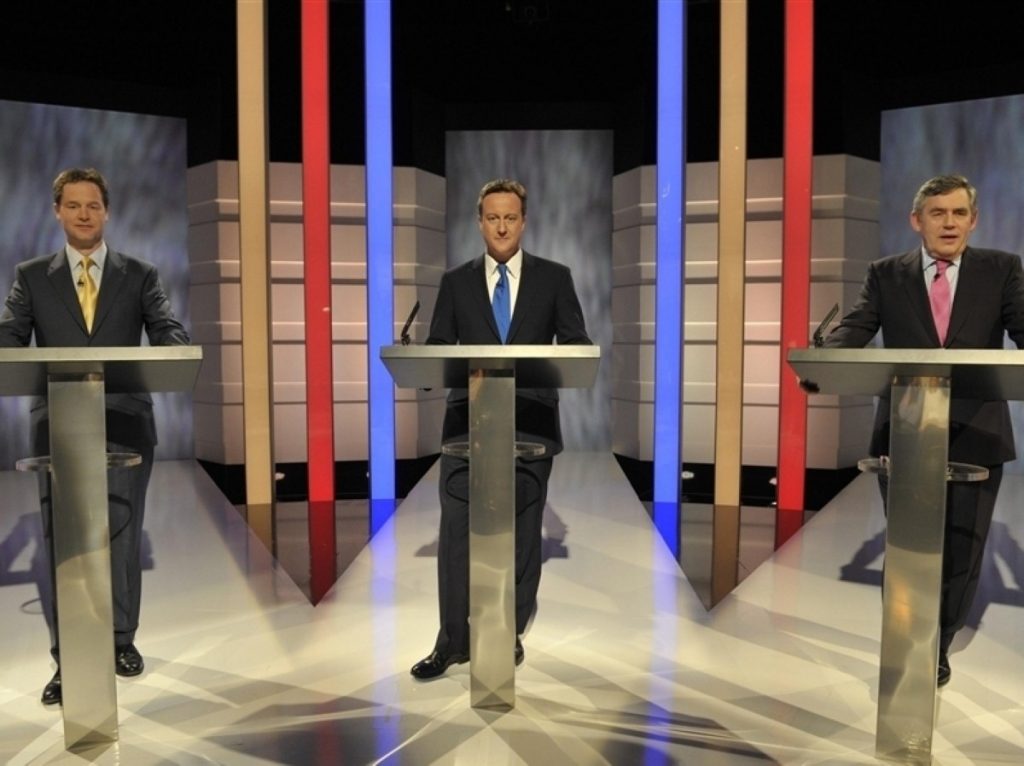Historic TV debate fires up election campaign
By Ian Dunt
Britain has seen the first live leaders’ TV debate in its political history, in an unprecedented milestone which fired up the election campaign.
“I’m here to persuade you that there is an alternative,” Nick Clegg said in his opening statement.
“Don’t let anyone tell you the only choice is old politics. We can do something new.”


See how it happened with politics.co.uk’s live blog
Gordon Brown said: “These are not ordinary times and this is no ordinary election. Every promise you hear from each of us this evening depends on one thing a strong economy. Get the decisions wrong now and we could have a double dip recession.
“As we cut the deficit we will protect your police, your national health service, and we will protect your schools.”
David Cameron said: “I think it’s great were having these debates and I hope they go some way to restore your trust. Your politicians – frankly all of us – let you down.
“There is a big choice in this election. We need to come together. We need to recognise we’re all in this together. We need change.”
The men clashed first on immigration, with Labour and the Liberal Democrats criticising the Tories’ annual cap proposal.
“I want us to bring immigration down so that it’s in the tens of thousands not the hundreds of thousands,” Mr Cameron said.
Mr Brown admitted: “I know people feel that there are pressures because of immigration. That’s why we want to control and manage immigration.”
The prime minister then managed an early jibe at Mr Cameron’s expense, mocking the Tory posters featuring Mr Brown’s face.
“No newspaper has done as much for me in the last two years,” he told the Tory leader, before thanking him and Michael Ashcroft, the Tory deputy chairman and a major donor to the party, for paying for the ads.
“You can’t airbrush policy, like you do posters,” he later told Mr Cameron.
The subject of cleaning up parliament in the wake of the expenses scandal saw Mr Brown repeatedly try to emphasise the similarities between the Labour and Liberal democrat positions – an attempt Mr Clegg was quick to shoot down.
On education, Mr Cameron won a favourable response by calling for more discipline in schools, but Mr Clegg won a favourable response when he said of his two opponents: “The more they attack each other, the more they sound exactly the same.”
All three men were offered a 90 second closing statement.
“I know many of you think politicians are all the same,” Mr Clegg said.
“I hope I’ve tried to show you that’s just not true.
“Give real change a chance. Trust your instincts. Chose something different.”
Mr Brown said: “It’s been a great opportunity to exchange ideas this evening. I know we’re not up against X Factor or Britain Got Talent, but I hope many people stuck with us.
“We have got to make a decision now about how we’re going to secure the recovery this year. We’ve got make sure the money is in the economy this year so the recovery is secure.”
Mr Cameron urged voters to “choose hope over fear”.
“We have incredibly exciting and optimistic plans about the future of our society.
“It’s been shown tonight that the idea you have to go on wasting money to secure the recovery has been shown to be wrong.
“If you work hard I’ll be behind you. If you want to raise a family I’ll support you.”
The three men had been busy testing themselves against colleagues and officials in advance of the broadcast, which was expected net tens of millions of viewers.
Polls indicated half the electorate will watch the debate – around the same number that turn out to vote.
Various social media tools were geared up to calculate the results of the debate, in an unprecedented technological approach to British electoral campaigning.
A Twitter tool created by political aggregator Tweetminster tracked posts by 5,000 designated Twitter users and judged their sentiment on a scale of one to five, thereby providing a real-time assessment of each leader’s performance.
Meanwhile, a Facebook tool invited the site’s millions of users to provide instant snapshots of the country’s reaction to the debate.
An audience reaction tool branded ‘the worm’ tracked the impressions of a panel picked by ITV News, which hosted the debate.
A second debate, on foreign affairs, will take place on Sky next week, while a third and final debate on the economy will take place the week after that on the BBC.









